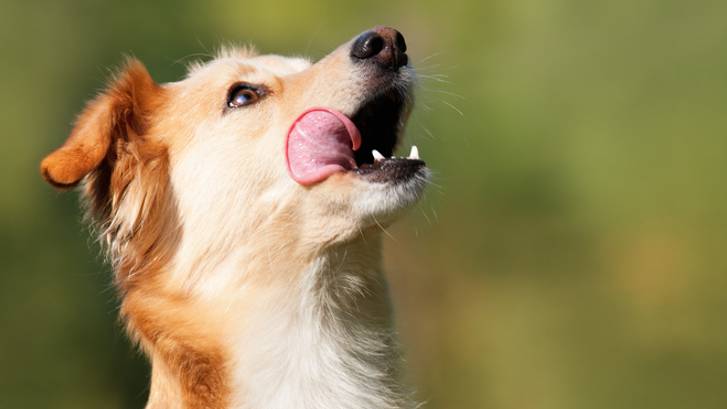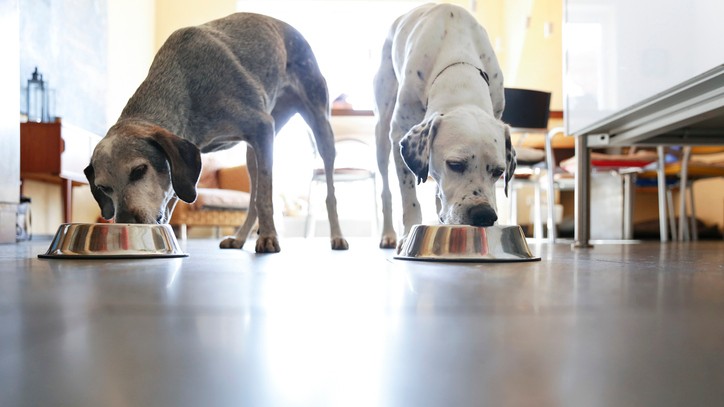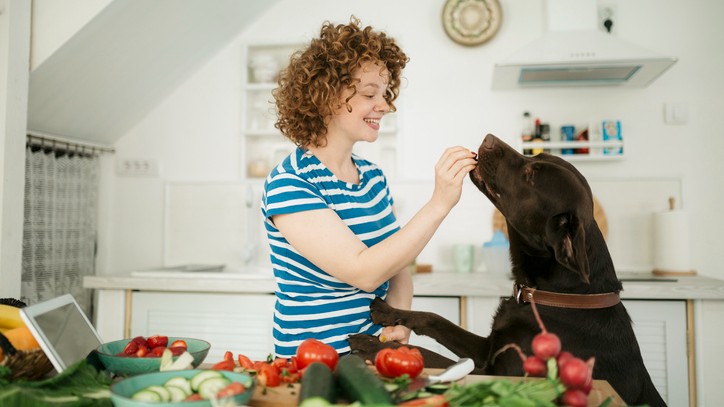Are dogs omnivores or carnivores?
If you’ve ever wondered whether dogs are omnivores or carnivores, then read on to find out more

Get the best advice, tips and top tech for your beloved Pets
You are now subscribed
Your newsletter sign-up was successful
Most dogs, as owners know, are pretty happy to eat anything – especially if it’s fallen on the floor or can be stolen from a countertop!
Just because they’re opportunists who’ll eat anything from raw vegetables to cookies doesn’t really answer the question of whether dogs are omnivores or carnivores, though. The answer is less clear but than you may think.
- Best wet dog food: Tasty dinners for your dog
- Best dry dog food: Quality kibble for growing pooches
Are dogs omnivores or carnivores?
Unlike cats, who can only process meat, dogs can digest foods other than meat to some extent. They’re not true omnivores, though, as they find it harder to digest plant-based proteins than meat-based.
They’re more ‘carnivore with a dash of omnivore’ so a little tricky to categorize! According to one of our in-house veterinarians dogs can even be vegan, although it’s harder to make a completely meat-free diet balanced.
Differences between omnivores and carnivores
Let’s start by taking a closer look at what the two diets actually are. ‘Carnivore’ is Latin for flesh or meat eater, while ‘omnivore’ means ‘eats everything’.
While a carnivore lives pretty much exclusively on meat, omnivores eat meat in addition to other foodstuffs such as vegetables and grains. Humans are naturally omnivores, whereas many other ‘hunter’ animals such as big cats and wolves are carnivores.
Carnivores have evolved to have jaws that can only be moved up and down, whereas herbivores can only move their jaws from side to side. Humans, as omnivores, have both vertical and lateral jaw movement.
Get the best advice, tips and top tech for your beloved Pets
Carnivores, herbivores and omnivores all have different digestive processes, too, to allow them to extract the correct nutrients from their respective food sources.

Qualities of an omnivore
Omnivores (a group which includes pigs, some species of bear and squirrels as well as humans) share some common characteristics.
- Two types of teeth Sharp incisor teeth for tearing, and flattened teeth for grinding.
- A varied diet Omnivores have a great evolutionary advantage as they’re able to forage on plant matter when meat is unavailable and vice versa. Unlike a true carnivore, though, omnivores can’t live on meat alone and need plant-based nutrients as well to survive.
- A digestive system with a single stomach The digestive system of an omnivore is typically simpler than that of a herbivore but more complicated than that of a carnivore.
Qualities of a carnivore
Carnivores, a group which includes big and domestic cats, hyenas and wolves, have also evolved to share the same evolutionary features.
- Sharp teeth Sharp incisors, canines and molars evolved to strip meat.
- Predatory qualities These include sharp claws and high levels of intelligence
- A simple digestive system Much less complicated than that of an herbivore as it's much easier for them to extract nutrients from their food.
- The need for an energy-rich diet Carnivores are predators so expend large amounts of energy in hunting. They need a nutritionally rich and accessible diet to give them enough calories for bursts of high speed and attacking prey.
What do dogs eat?
In the wild, dogs will eat a variety of foods including the raw meat, bones and organs of their prey. They also eat the small amount of vegetable matter in the guts of their kill. For domesticated dogs, this balance can be replicated with a commercial all-in-one dog food or by feeding a carefully balanced diet made up of different ingredients.
Whatever you feed your dog, it must be appropriate for his age, size, health and the amount of exercise he’s doing – elderly, young and hard-working dogs will need more nutrients than sofa-surfers! Bones and raw meat are not recommended as they can carry bacteria and your pooch could also break a tooth on them.
Domestic dogs have evolved to digest both starch and fat, so you can feed fish (watch out for fish bones!), cooked vegetables such as carrot and pumpkin and small amounts of rice or pasta.
Avoid anything with too high a fat or salt content, such as bologna sausage. For more ideas, take a look at how to choose the perfect food for your dog.

The best diet for dogs
When you’re deciding on a delicious diet for your devoted dog, the important thing to remember is that one size doesn’t fit all. Speaking to the Readers’ Digest, Ernie Ward, DVM and founder of the Association for Pet Obesity Prevention, said: “Pay attention to how your dog is doing on the diet you’re feeding.”
If you don’t get the diet right, you’ll see symptoms such as bad breath, dental disease, weight gain or loss, diarrhea or too much/too little energy.
According to the American Kennel Club, vegetables can be a good source of essential minerals and fiber. A good commercial dog food will contain vegetables, fruit and grain as well as meat and be made from high quality ingredients.
Whatever you choose, the bag should be stamped with ‘formulated to meet the nutritional levels established by the Association of American Feed Control Officials (AAFCO)’. This is a guarantee that whatever’s in the bag is nutritionally complete and balanced. Check out our guide to the best dog food for more ideas on what to feed.
The carnivore vs. omnivore debate
Even the veterinary and scientific world can’t completely agree on whether dogs are carnivores or omnivores, so it’s no wonder we get confused as owners!
Many of us are giving more thought to what we eat ourselves and eliminating or reducing the meat in our diets for both health and environmental reasons. We want to do the best for our pets, as well, so it it’s natural to wonder if we should be re-evaluating their diets.
Some of us also have concerns about the ingredients of commercial dog food and prefer to make up our own dog food. As long as you’re careful to provide all the necessary vitamins and minerals your pooch is unlikely to worry too much about the exact ratio of plant-based protein to meat!
Conclusion
As dogs are capable of digesting a range of foods, what you actually feed is very much a matter of choice as long as the diet is balanced.
If you plan to put together your own meal plan, then enlist the help of your veterinarian or a specialist canine nutritionist to make sure your doggo has everything he needs. If his diet is suiting him, he’ll be bright, alert and full of energy. Otherwise, it’s time to take another look at what’s in his bowl.
Sara is a freelance journalist and copywriter of many years’ experience with a lifelong love of animals. She’s written for a range of magazines and websites on subjects varying from pet care to travel. A horse rider since the age of five, she’s currently a full time pet slave to horse Blue and gorgeous, goofy English Springer Spaniel Olly. Adorable Olly has a huge sense of adventure and no sense of direction, keeping Sara on her toes.

